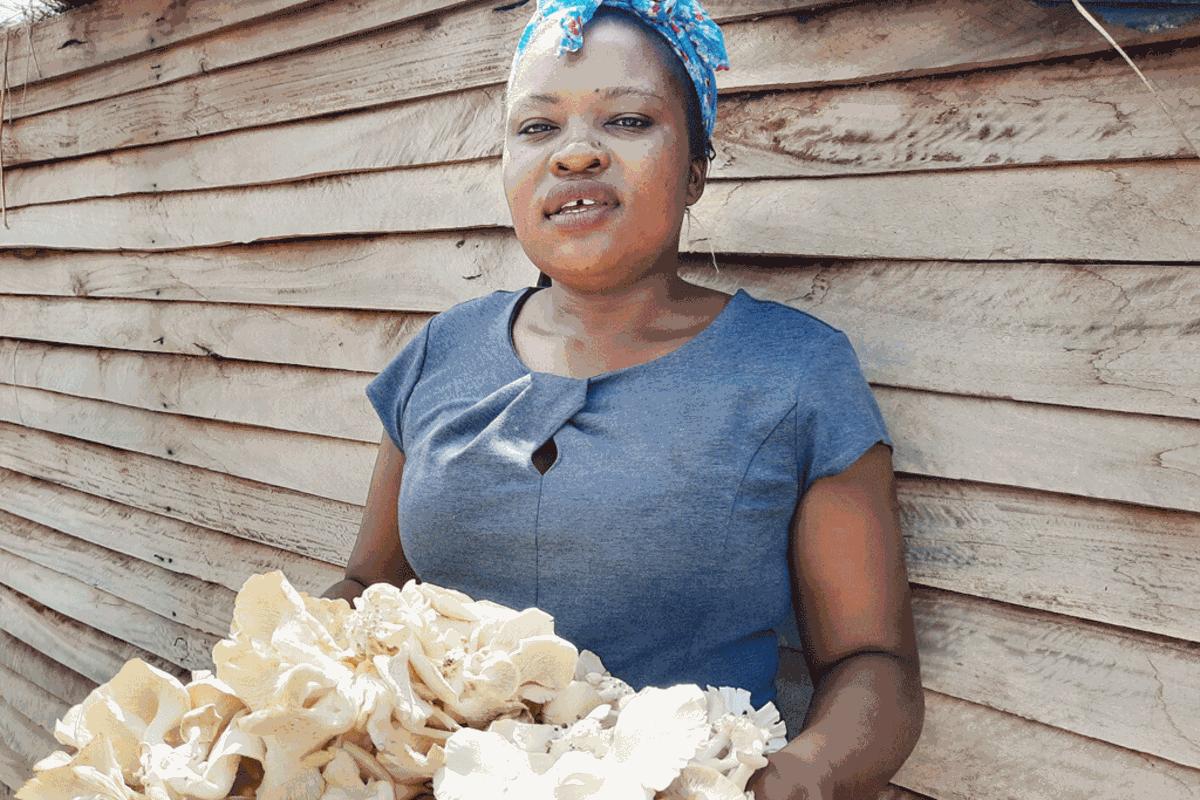Africa-Press – Uganda. It is early morning and despite the slight chill following a touch of rain the night before. Charlotte Ebber Mutodi’s five-year old son is following her as she checks on the oyster mushrooms in the growing room.
With a tray in her hands, ready to pick the mature mushrooms, she inspects the progress on the new batch she planted three weeks ago in a concrete cement structure covered with plastic and grass-thatched roofing. Once she fills the tray, Mutodi empties the mushrooms into a bucket.
Her son is trying to mimic what his mother is doing. But Mutodi has her eyes and mind firmly fixed on the “flowering gold”.
Inspiration
This has been the 27-year-old’s daily routine for the last five years, ever since she graduated from Zimbabwe’s Midlands State University with an Agricultural Economics degree, in 2016.
Unlike other young graduates, Mutodi never even attempted to send out a resume. After graduation, she decided not to put herself through the tedium of trying to find a job.
“Most of my former classmates are still looking for employment five years after graduating. Those formally employed complain daily because they get paid in our local currency. It is not stable because of high inflation,” she explained.
According to Education Statistics Report released by the Zimbabwe National Statistics Agency in December 2021, 62,629 female and 53,699 male students enrolled at Zimbabwe’s universities in 2020. Yet unemployment rates are sky-high and opportunities for young graduates are few. Having seen those who had graduated before her get stuck in limbo after seeking formal employment, Mutodi chose not to become a statistic.
Her dream
Mutodi had fallen in love with oyster mushroom farming during a student work-related learning attachment. She got an opportunity to do her industrial attachment at the Department of Agricultural Technical and Extension Services (AGRITEX), a government department that mobilises and provides advisory services to farmers. During this time, Mutodi was taught how to grow mushrooms. For her, this offered a way of life that she had always dreamed of. “Mushroom farming has enabled me to be self-sufficient; I run my own business and have managed to employ three other people,” Mutodi said.
Oyster mushrooms are scientifically referred to as Pleurotus ostreatus. They are usually white, but some can be grey or tan, with oyster or fan-shaped caps. They grow in clusters of small mushrooms or individually as larger mushrooms. Their growing requirements offer a business opportunity for anyone who can reproduce the mushroom’s optimum growing conditions, even in a small space.
A back-yard business
After university and now, living with her husband, Mutodi pursued her dream, planting oyster mushrooms right in the backyard at her new home. She started her mushroom project with growing structures made of black plastic sheeting at her home in Ruwa, about 25 kilometres from Harare. She has been steadily improving her growing rooms with every harvest.
“I did not have enough capital to start this project, so I gathered maize stalks and bought spore and mushroom seed for $10. I then went around collecting plastic paper bags from people; I basically recycled bread bags. I built my mushroom growing structure from black sheeting and started growing mushrooms. I started with a total of twenty dollars,” she explained.
Starting on small scale
Mutodi initially planted 30 bags in that structure, and after harvest, she made a profit of $60. She used that money to buy more materials and spores. She started on a small scale but today has a number of structures where she grows mushrooms, including on a small plot eight kilometres away, in Goromonzi. She hopes to expand her project further.
For a visitor, they are an eyesore and intrusion on this orderly and modern neighbourhood with houses standing on neatly manicured lawns fenced off with well-cut green hedges and brick walls. But soon, Mutodi plans to reconstruct the growing rooms into complete cement blocks to strengthen and expand the structures. However, her venture is paying off.
Market
“My desire has always been that one day I would run a successful farming business,” Mutodi said.
Mutodi supplies local supermarkets and is in the process of making mobile vegetable carts. These will be moving around suburbs selling mushrooms as ice cream vendors do.
Currently, she supplies 200-300 punnets of mushrooms a week with the intention of scaling up to 900 punnets weekly.
Spotting an opportunity
Mutodi has not only been successful because of her agricultural training. She also spotted an opportunity, mushrooms thrive during the rainy season and are a delicacy in Zimbabwe. But the prices spike when out of season due to low supply and high demand.
Mushrooms are so popular in Zimbabwe that when in season, it is common to see families out in the deep woods picking mushrooms, which grow wild. They say the rains are the equaliser as both the low-income earners and the elite can all afford the treasured dish.
But the mushroom season is now unpredictable because of erratic rainfall patterns caused by climate change–and this threatens to relegate mushrooms to the elite tables only. Even those who can afford the pricey delicacy are never assured of its availability.
All-season supply
Which is where Mutodi comes in – to keep a constant, all-season supply using smart farming techniques where the oyster mushrooms, which take 21 days to flower, can be harvested all year round.
She has found a way to bring this luxury to the dining table of every family that not only desires it but can afford it, in and out of season.
A healthy alternative
Sandra Garwe, a Global Health Professional, says mushrooms are known for their low fat and high protein content. The Zimbabwean diet is primarily based on cereals (maize), and there is an increased chance of protein deficiency. “Proteins and amino acids are fundamental to optimal nutrition. They also play a central role in biological processes. These oyster mushrooms are a healthier and cheaper alternative source of protein.
Also, with challenges in non-communicable diseases such as diabetes, there is a need to rethink our diet, and mushroom is a good substitute because of its low fat,” Garwe explained.
In addition, William Rumbidzai Mukori, a registered nutritionist and certified health and weight management coach, said that mushrooms are the only vegan, non-fortified dietary source of vitamin D and provide vegans with micronutrients that are not available from other foods.
According to Mukodi, mushroom farming promotes food security as it does not occupy a large space and can be grown irrespective of weather patterns. Mushrooms are grown year-round across the nation. On average, one square foot of space in a mushroom bed can produce 6.55 pounds of mushrooms.
“Mushroom produce can also be used in the production of a variety of products, such as dried mushrooms, soups, seasoning, fresh and canned,” William said.
Growth in Africa
In Zimbabwe, mushroom farming is still in its infancy, with women such as Mutodi leading in establishing Zimbabwe as a mushroom farming hub. According to reports, Zambia is the largest dried mushroom supplier in Africa, comprising 81 percent of total exports; followed by Egypt, with a 4.5 percent share of total exports. Senegal comes in third with a 2.7 percent share.
Hazel Munatswa, who heads the Research and Development department for the Zimbabwe Mushroom Farmers Association, says that there is room for mushroom farmers to increase their production scale until they can tap into the export market.
“We target the markets that we have here in Zimbabwe because mushrooms are highly perishable; you have to know where you will take your product before you produce it,” Munatswa explained.
“I chose mushrooms because it is easier to grow. When growing mushrooms, the monitoring and supervision is minimal and simple compared to someone growing onions or tomatoes on a hectare.
Plenty of challenges
But running the business has not been without its fair share of challenges. Mutodi had to rebuild her growing rooms in February this year after a hailstorm destroyed them, and she lost all the spores she had.
Apart from growing and selling mushrooms, Mutodi offers training to people who want to start mushroom farming under her company Ebber Mushrooms. They also sell kits; these are already-prepared implements compromising of spores and feed that are ready for the growing room. These kits will only take seven days to start fruiting.
Natasha Munhande, 30, a resident of Midlands province in Gweru, learnt all about mushroom farming from Mutodi. “There is a big market for mushrooms this side because not many people are doing it. People are dependent on wild mushrooms that grow seasonally. But with me, they get it all year round,” Munhande says.
Mutodi agrees. On the day we visit her operation, she is with one of her employees getting ready to take a fresh batch to a local vegetable market, located a few kilometres from her home. She hopes to make more money there because it has become the primary mushroom market.
Challenges
Running a mushroom business has not been without its fair share of challenges. Mutodi had to rebuild her growing rooms in February this year after a hailstorm destroyed them, and she lost all the spores she had.
Apart from growing and selling mushrooms, Mutodi offers training to people who want to start mushroom farming under her company Ebber Mushrooms. They also sell kits; these are already-prepared implements compromising of spores and feed that are ready for the growing room.
For More News And Analysis About Uganda Follow Africa-Press






